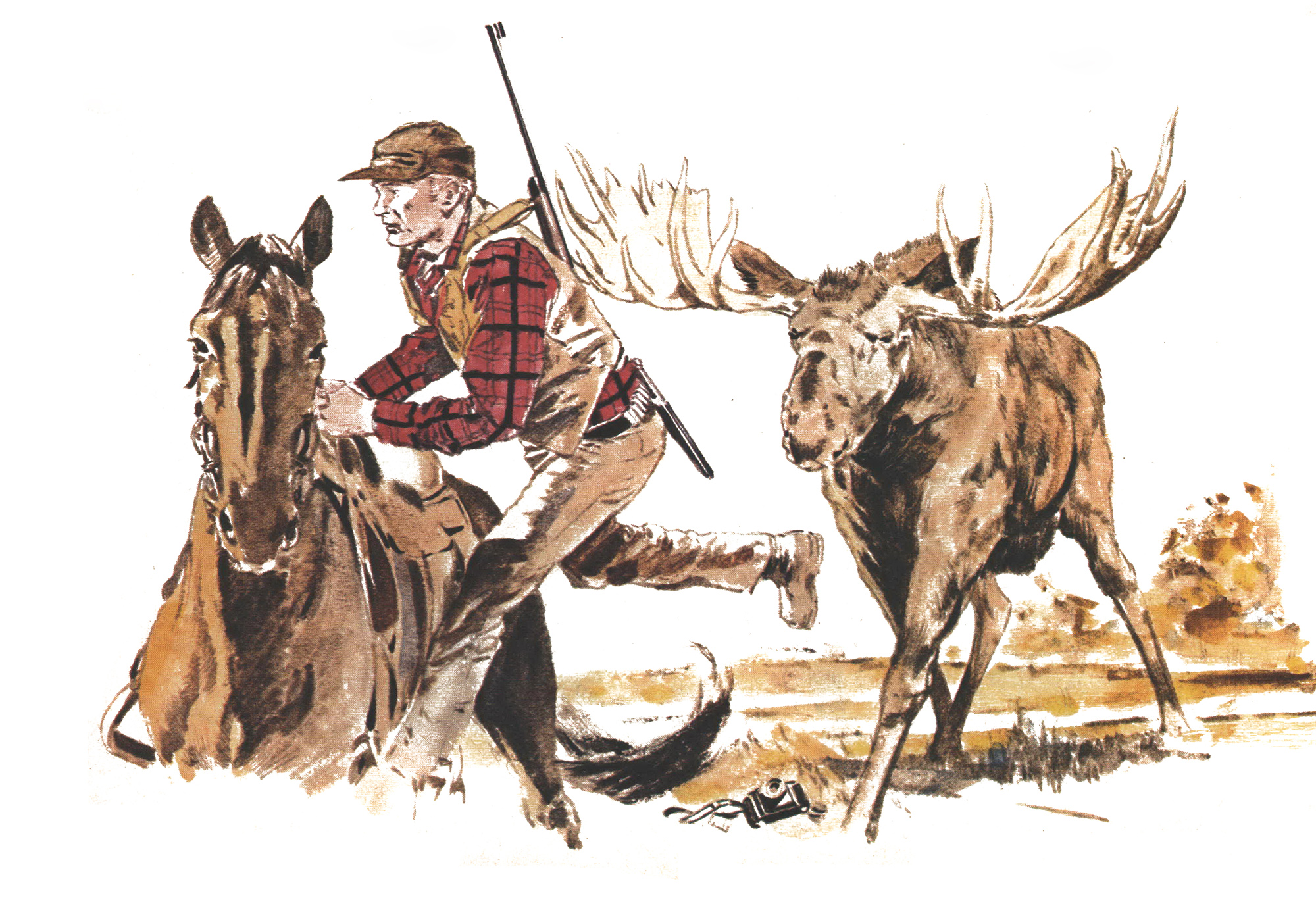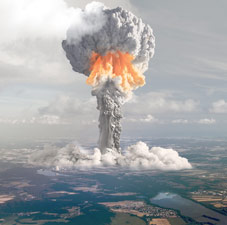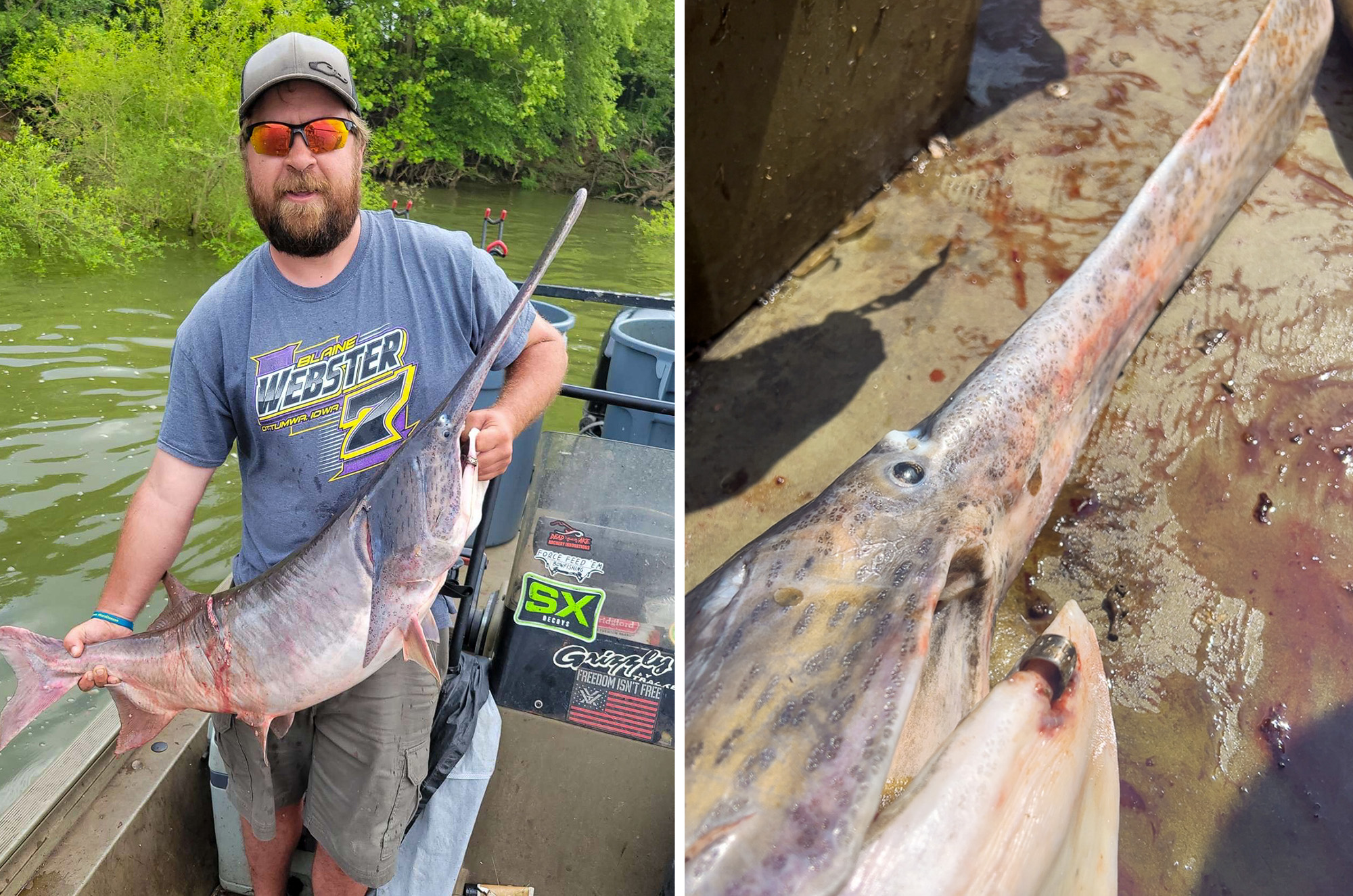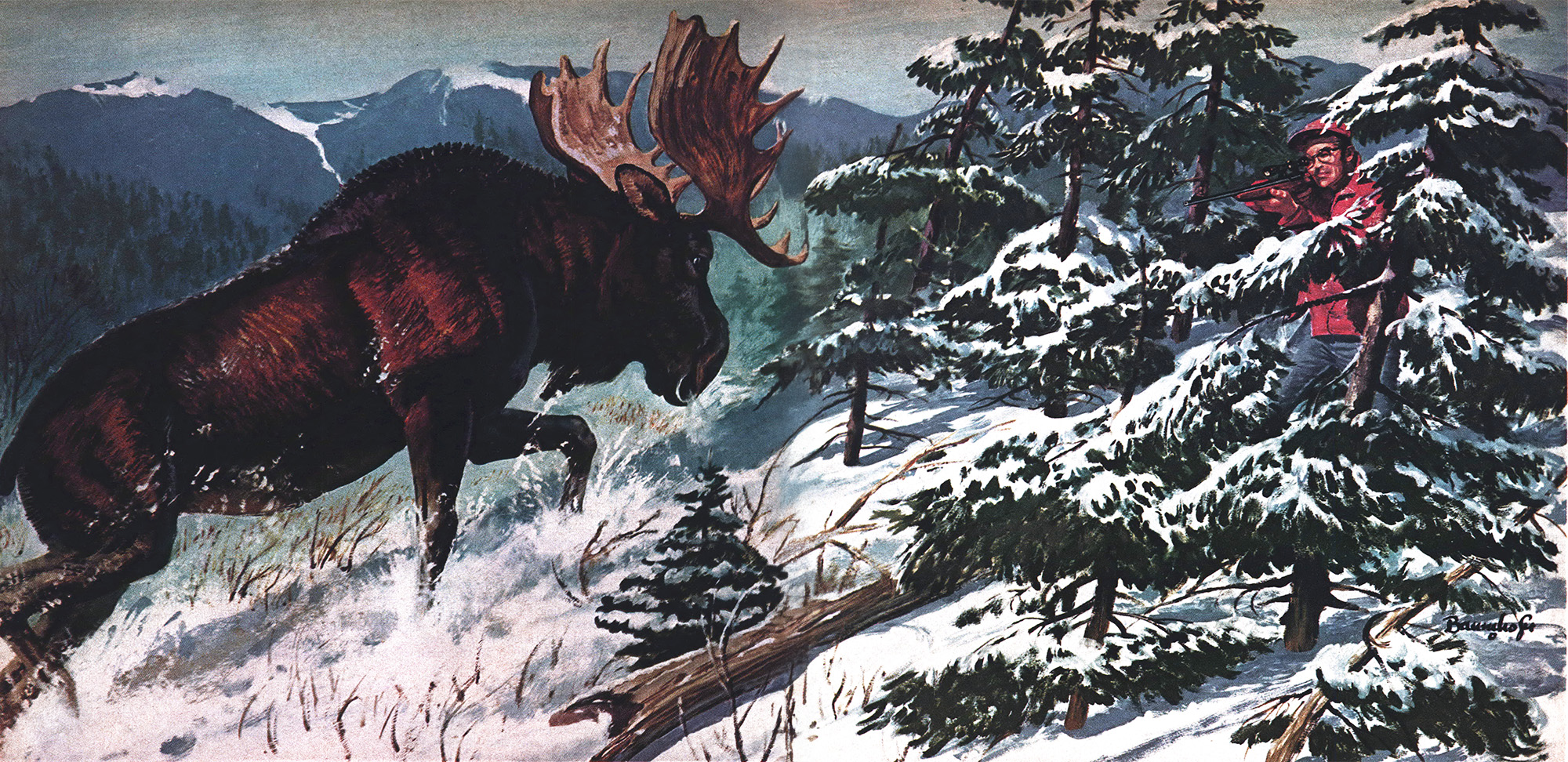How I Almost Died a Dozen Times While Hunting

This story, “On Borrowed Time,” appeared in the May 1982 issue of Outdoor Life.
Adventure, some experts claim, is a happening, or series of happenings, which stems from a source such as carelessness, impulsive action or lack of preparation.
Most of the time this definition may fit, but it is not always true. Every time a man goes into the woods he takes a chance that a tree may fall on him, or a mountain; or a mamma bear he hasn’t seen will stand up close enough to scalp him.
There’s no way you can plan for a capricious nature or the sudden impulses of its citizens. For this reason, most of us who have lived close to the earth are, in a sense, living on borrowed time. Any perennial outdoorsman can recount many experiences when the reaper’s scythe just missed him. More often than not, it was so sudden that he only had a split second to react.
Walter Straley and I were hunting deer in the high Cascades of northern Washington. If you’ve been there, you know how rugged that country is, and when you get away from the trails, you do your horse a favor if you hunt on foot.
We had tied our mounts in a patch of spruce and climbed the craggy backbone of a ridge before separating to cover more territory. Our plan was to separate, hunt upwind and meet again on the trail about two miles farther west.
At approximately the same time and about half a mile apart, we arrived at the east edge of a tremendous gash in the face of the mountain. It was more of a semivertical canyon, but I’d have to cross it to make my rendezvous with Walter. Yet I was strongly reluctant to make the descent into that hole. I perched on the rim and tried to reason it out. I sat there for 20 minutes, fighting that strange premonition. It didn’t pass, but I stood up with the intention of crossing the canyon anyway. Before I could move, I heard what sounded like a rifle shot, followed almost immediately by a rattle of small-arms fire, and then a roar as though the whole face of the mountain had been blasted away.
Instinctively, I turned and ducked away from the edge while behind me the whole world seemed to explode. I looked back to see rocks hurtling through the tops of the trees. When the grinding crash had slowly died, I made my way back to the edge of the canyon. The bottom was buried under a mass of slabs and boulders. Terror gripped me when I thought of Walter on the hillside above, and I started climbing.
In a few minutes I met him coming down the rim. He’d paused, as I had, hesitant to climb into that hole, and had been standing there when the overhanging top of the mountain collapsed.
“No need to hunt here,” he said mildly. “That ruckus scared every deer out of this country.”
Experiences like that stay with a man as long as he lives. Some he never recalls without a word of thanks to the man upstairs. Walter had a few behind him, as does every outdoorsman I know. I’ve had my share and can only hope that my time is not running out.
I went through a series of these near disasters in the subarctic when a group of us spent two weeks flying over Canada’s Northwest Territories to explore the fishing lakes far off the beaten trail. The fishing was fabulous, but several times on the trip I’d have wagered that we’d never get the chance to go home and write about it. Our big problem was a drunk.
I should have suspected what might be ahead of us when we roared off Lynn Lake in a chartered plane on the first leg of our journey. In the plane with me were the pilot and our drunken passenger. We were to meet the other members of our party at Reindeer Lake. We’d come in to Lynn Lake on a commercial flight and in the couple of hours while the charter flight was being readied, this guy had gotten himself thoroughly soused. When the pilot saw his condition, he sat him on a cushion in a comer immediately behind the co-pilot’s seat that I sat down in.
I opened the large switchblade knife I carried and held it in front of him.
“You get another cigarette or match and I’ll cut your throat.”
Behind the pilot’s seat were three 50-gallon drums of emergency gasoline. They had been rather carelessly overfilled and half an inch of gas sloshed on top of the barrels. When we began our ascent, the gas had spilled over the barrels’ sides.
Perhaps it was premonition that made me glance back at our passenger who sat right behind me. He had a cigarette in his mouth and a match in his hand and was about to reach over and strike it against one of the barrels. In another split second that plane would have exploded in flames. I slapped the unlit match out of his hand and almost in the same motion picked the cigarette from his lips.
“What are you trying to do?” I guess I must have yelled; though I have no recollection of it.
“Aw,” he mumbled, “what’s the beef? I’ve smoked on planes before.”
I opened the large switchblade knife I carried and held it in front of him.
“You get another cigarette or match and I’ll cut your throat,” I said. Sometimes rough language is all a drunk can understand. Nevertheless I kept an eye on him for the remainder of that first short flight.
This was only the beginning. It seemed that every time the guy sobered up enough to make a move, he put us in some kind of danger. It climaxed our last night out when we approached Reindeer Lake just at dusk. Anglers were returning to camp from various points in the lake, so our pilot picked the spot least likely to have boats on it. It was open water except along the edges where rocks and reefs broke through the surface. With his landing lights on, the pilot could pick his landing spot on the water more easily, and any boat could see us and maneuver out of danger.
Just as we were swinging for an approach, the goof crawled from his seat on the cabin floor to the front of the plane, tried to pull himself up, lost his balance and jabbed his elbow into the switchbox immediately behind the pilot’s seat. Sparks showered the interior of the cabin. (Fortunately we’d left the empty gasoline drums at a lake farther north.)
“Sit down!” the pilot yelled, and two of our party pulled the drunk back into the cabin. But the damage was done. The entire electrical system was dead. There were no landing lights or lights in the cabin. All of the controls were manual. The pilot shook his head in disgust.
“Well, we’ll try her. We can’t stay up here all night.”
He nosed down toward where he remembered an open stretch of water and I sat there praying there would be no boats or reefs in the way. He leveled out over the water and it seemed that we flew a long way searching for the surface. When the pontoons finally touched, I was so keyed up that the only thing holding me down was my seat belt.
We taxied around and made the long trip back to the dock where someone helped our drunk to his cabin. That was the last I ever saw of him and the last I ever wanted to.
I had another near miss of the scythe on a moose hunt at Lac Seul in western Ontario. It was a few days before Christmas. The temperature was a bit on the chilly side, at 45° below zero. Transportation to and around our hunting camp was by “Scoot,” a tin boat with a cabin and airplane motor that Bill Bousfield had put together to skim at incredible speeds over the ice.
I had arrived at Bill’s lodge in my leather quail boots, but had the forethought to bring along a pair of galoshes that I figured would protect my boots and feet from the arctic breezes. For all the good they did, I could have been barefoot.
The evening before we went to our hunting camp several miles up the lake, Bill drove me to a Native trading post nearby, where I pulled off my leather boots and started pulling on wool stockings until the four or five layers were bulky enough to fill the galoshes without the boots. This was my footwear for the expedition, and as it turned out, it was a combination that probably saved my life.
It didn’t take long to find out that at -45° if you don’t keep moving you become congealed in a very short time. Bill would take me to one of the shores away from camp and I’d range the forested terrain from early morning until dusk before he came back to pick me up.
One morning I climbed out of the modified airboat on one of the big arms of the lake, some four miles from camp. We were able to get no closer to shore than about 50 yards because of the stumps and logs from timber that had been killed when the lake was impounded.
“That wooded point running into the main lake,” Bill said, “should have some good bulls on it. If you kill one, dress him out and we’ll haul him in later. See you in about five hours.”
I watched him take off up the lake, then I started ashore, walking cautiously on the ice to keep from slipping. What neither Bill nor I knew was that while the ice in the main lake was between two and three feet thick, back in this quiet cove away from the wind, the beginning of the freeze had put an inch or more on the water and shortly after that, the water level had dropped about three feet. Having no wave action or current to break it up, the thin skim of ice had remained as a sort of shell on top.
I was within a dozen yards of shore when my foot broke through the ice. As circumstances would have it, the toe of my galosh slid under a log on the bottom and my weight jammed my heel under another log lying close to it. My foot was caught as tightly as if I had stepped into a trap. I pulled, but nothing budged.
My foot was stuck more than two feet under the surface skim of ice. Fortunately, the water was below that level. There was no way I could twist my body around and reach the galosh with my hand, or break away any more of the ice. A shiver of panic ran through me: Five hours in this position and when Bill came back, all he might find would be a human hunk of ice.
Somehow only three matches remained. And they were damp.
It must have been that touch of panic that gave me enough strength to lay my gun on the ice and brace against it with more power than I knew I had. My foot came out bare, leaving the galosh and layers of socks under the log. I lay on my belly and was able to reach the footwear with my fingers and work it out from under the log. Unmindful of the slippery ice, I sprinted for shore, built a quick fire and while the blaze was catching up, pulled on the socks and galosh. Had I been wearing boots instead of the loose galoshes, I’m sure I’d have frozen as stiff as a board in that very spot.
Only one other time did I get into deep trouble with temperatures.
I manned a fire lookout station in the mountains of western Montana for most of one summer. As fall approached, I was sent from the station to put out a small lightning fire several miles from my tower. All of that country stood on end and it took me all day to reach the fire. Before I arrived at the site, a drizzle of cold rain had set in and made my cleanup job easy.
I had a couple of hours of daylight left, so instead of making a campfire and spending the night where I was, I started back to the tower. When it began to get dark, I knew I’d made a mistake. I was in a jungle of windthrown timber so thick that the only way I could cross it was by stepping from one horizontal tree trunk to another, about six feet above the ground. My clothes were wet with sweat on the inside and wet on the outside from a mixture of rain, snow and sleet, and some of the mist was freezing on the trees. The night was so black that I couldn’t see where I was stepping.
I crawled through an opening to the ground and gathered some dry twigs and limbs from the underside of those tree trunks and felt for the kitchen matches I carried loose in the breast pocket of my jacket. I hadn’t noticed it before, but somehow I’d snagged the pocket and out of the fistful of matches I’d put there when I left my tent at the lookout, only three matches remained. And they were damp.
The backpack where I carried tools for fire fighting had a few emergency supplies and among them was the stub of a candle. This I carefully set on the ground close by my pile of tinder. For several minutes. I rubbed one of the matches in my hair, which was the only dry spot on my body, and when it felt dry enough I struck it on the handle of my knife. It flared up but when I put it to the candle wick, it flared out again. I went to work with the other two matches and after four or five minutes tried the second match — with the same results. Then I began to get worried. I was already chilled through and I either had to have a fire or keep moving. I might somehow manage to work my way through that windfall in total blackness but the country between me and the lookout several miles away was marked by a series of cliffs that I could easily stumble over in the darkness. I knew that I only had two choices: I could get a fire going or I could flounder through the darkness and face whatever might await me.
You can bet that even though I was beginning to shake from the cold, I nursed that third match a long time. I had reached a sort of “hell-with-it” attitude by the time I decided to try it. The match flared, as the others had done, and I jammed it against the candle wick. The match went out but it left an almost infinitesimal spark of fire at the tip of the wick. I cupped my hands around it and held my breath and the flame grew larger. Very carefully, I piled my dry twigs and other wood around it and breathed a big sigh when the pile of sticks caught fire.
I spent the night sitting against a tree trunk, partially sheltered from the icy mist, my blanket hooded around me, with the fire close enough to pour heat under my blanket. I’d doze from time to time, then wake up and add more fuel when the fire died down.
I have no way of knowing what might have happened had I not been able to get my fire started, but this was one of the occasions when the fates could have decided either way.
Once I crawled up a sharply angled terrace of an abandoned mountain farm and carefully pushed my head over the crest to look for deer around the opening where the farmhouse had stood. My eyes came level with and about eight inches from a coiled copperhead. Its triangular head was drawn back into a striking position. It must have been as surprised as I was, for we simply stared at one another. Then very, very slowly, I pulled my head back below the crest of the terrace until I got enough distance between us to tum loose and roll down the hill. I walked around the end of the terrace to the hill above the snake and picked up a big rock. I held it for a moment and then put it down again. It was only fair that I spare its life as it had spared mine.
Many of these split-second circumstances come up so suddenly and unexpectedly, there is no way to even anticipate them. A near miss can only mean one thing: Somebody’s looking out for you.
I recall a picture-taking expedition to the east coast of southern Florida. We were in a fast motor boat and covered a lot of territory at 40 to 50 miles per hour, up and down the narrow saltwater creeks. We were off the inland waterway, and many of the bridges between the mainland and beach were so close to the water at high tide that we could barely skim under them. That these might be hazardous did not occur to me.
We were zooming along one of the creeks at rocket speed when I looked behind me and saw a scene I knew would look good on film. I stepped behind the pilot and stood up to take the picture.
I was looking through my camera when a yell penetrated the roar of the motor and I glanced around. We couldn’t have been more than 50 yards from one of those bridges that sat so low over the water that our windshield would miss it by inches.
A fisherman standing on the bridge had screamed at the top of his voice to warn me. I dived into the bottom of the boat a split second before we went under a steel bridge beam that would have taken my head off.
Many of these split-second circumstances come up so suddenly and unexpectedly, there is no way to even anticipate them.
Perhaps I have weird ideas, but I’m completely entranced with thunderstorms. I’ve spent many delightful hours under a rock overhang above a trout stream while the lightning crashed and the thunder rolled and the wind and torrents of rain tried to strip the forest bare of leaves. From my place under the rock, I enjoyed every minute.
As far as I know, I’ve had only two touchy affairs with those thunderbolts out of the sky. One was on a Wyoming peak where an electrical storm rolled unexpectedly over the ridge and caught me flat-footed. High up like that, you’re a sitting duck for such erratic actions of the gods, and my only thought was to get off the mountain.
I started my horse at a fast clip over the trail that led under a tall, solitary pine near the top of the ridge. I’m sure I wasn’t thinking. With lightning hitting all around, I should have stepped off the trail and given the tree a wide berth. Luckily, I was still more than a hundred feet away when a bolt struck the pine and almost exploded it, sending limbs and bark flying in all directions. Half a minute later I’d have been directly under it. I shudder to think what might have happened.
There are very few times I’ve been caught in a storm over the water. When black clouds with wind and lightning roll across the horizon, I head for shore, as any sensible person should do.
A storm blew in over Clark Hill Reservoir on the border between Georgia and South Carolina, where I was fishing with a partner who was a vacationing commercial guide. We were about three miles from the marina when we spotted the clouds, and should have pulled ashore in the lee of one of the islands. But the guide had a fast boat and thought we might be able to reach the marina before the disturbance touched that part of the lake.
It was coming faster than either of us realized, and hit us full blast about halfway to the boat dock. The rain was as thick as a waterfall. We could hardly see from one end of the boat to the other. Even with rainsuits on, we got soaked.
I didn’t mind being wet, but what concerned me was the lightning. It wasn’t jumping from cloud to cloud as the bolts sometimes do-those jagged bolts were coming all the way to earth and hitting the water around us. A few hit so close that above the roar of the motor, the wind and the rain, we could hear the pop and sizzle of water when the bolt hit. I don’t know about my partner, but it gave me the feeling of being shot at like ducks on the water, and I remember having a small thought of thankfulness that the storm gods never quite got the proper lead on us in flight.
The wind was high and the storm blew over almost as quickly as it had come. Somehow we’d been blown or twisted at an angle on our course to the dock and when the rain slacked enough so that we could see, we were near the opposite shore, across the lake from the marina. The storm had moved on, but it sure left this fisherman with a vast sense of gratitude that we had been spared a direct hit from one of those high-voltage spears.
I’ve been charged by several animals with lethal intentions, but somehow the dice always seemed to roll in my favor. In Alaska, a wounded brown bear rolled over on his feet and came at me from 60 feet away, roaring and slapping with his big paws. I had one .30/06 shell left in my rifle and knew I had to kill him with that. The guide was standing next to me, without a rifle, and when the brownie was within about 20 feet with my sights on his head, the guide thought I had become frozen with terror and took off up the mountain. The bear turned and went after him and spoiled my sure shot. He didn’t chase the guide but a few yards, then turned and for some reason went back to the brush under which he had laid before the charge. I shot him in the head.
I can think of several things that might have happened. I could have shot too soon and missed, or it could have come that last 20 feet with new lead in him.
Once, in the Bahama Islands, a very large boar being bayed by a couple of dogs swung and charged me from a few feet away when I snapped a flash bulb in his face to take a picture. The brush was too spindly to climb and too thick for a fast getaway, and the big Bahamian guide saved my hide by swinging his heavy machete to knock the boar down and fall on it.
In Wyoming, I had a huge bull moose chase me to my horse after I’d taken a picture. I can only be thankful that the horse didn’t spook or shy away, and I was able to hit the saddle on a dead run.
These and other similar incidents didn’t worry me, but I often wonder what would have resulted had it not been for the split seconds or inches.
Saint Peter missed a chance of getting a good look at me when I fell over the edge of a cliff in Washington. I was hanging on to what I thought was a well-anchored bush when it pulled out of the ground. I landed on a narrow ledge about 10 feet below and dug my fingers in to hold on, or I’d have gone into orbit. My rifle was under me when I landed on my back and for about a week I walked around with a knot about the size of my fist on my shoulder.
Read Next: How to Insult Your Western Hunting Guide
As with other outdoorsmen I know who have regaled me with similar experiences, I feel as though many of us are living on borrowed time. There must be some reason that one of those disasters has never quite caught up with me. But that doesn’t keep me from being grateful.
Read the full article here









